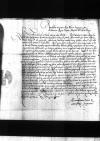List #5722
Sigismund I Jagiellon do Ioannes DANTISCUSCracow (Kraków), 1545-06-13
| odebrano Heilsberg (Lidzbark Warmiński), 1545-06-26 Rękopiśmienne podstawy źródłowe:
| ||||
Tekst + aparat krytyczny + komentarz Zwykły tekst Tekst + komentarz Tekst + aparat krytyczny Ekscerpty dotyczące podróży Dantyszka
Reverendo in Christo Patri, domino
Reverende in Christo Pater et Domine sincere nobis dilecte.
Quod
Quod si illo tempore aut ex comitiis, aut saltem a nobilitate postea, quem maxime cuperent, substitui certiores facti essemus, non detrectassemus eum auctoritate nostra regia substituere, quem gratum esse prae ceteris et idoneum accepissemus. Sed cum de voluntate
Quam ob rem qui auctoritate nostra regia constituti sunt, eis pareri volumus. Nam quod nullas habent in terra Culmensi possessiones, id movere neminem debet, quandoquidem non palatini ipsi sunt, sed palatini tantum locum obtinent. Sumptibus opus non erit, nam citationes a palatino ipso peti possunt, qui vero locum eius tenere debebunt, ii suo sumptu ad eum locum, ubi iudicia exercebuntur, proficisci erunt obligati. Qui proxime defunctus est
Quae bene valeat.
Dat(ae) or Dat(um)⌈Dat(ae)Dat(ae) or Dat(um)⌉


 BNW, BOZ, 953, f. 252v
BNW, BOZ, 953, f. 252v